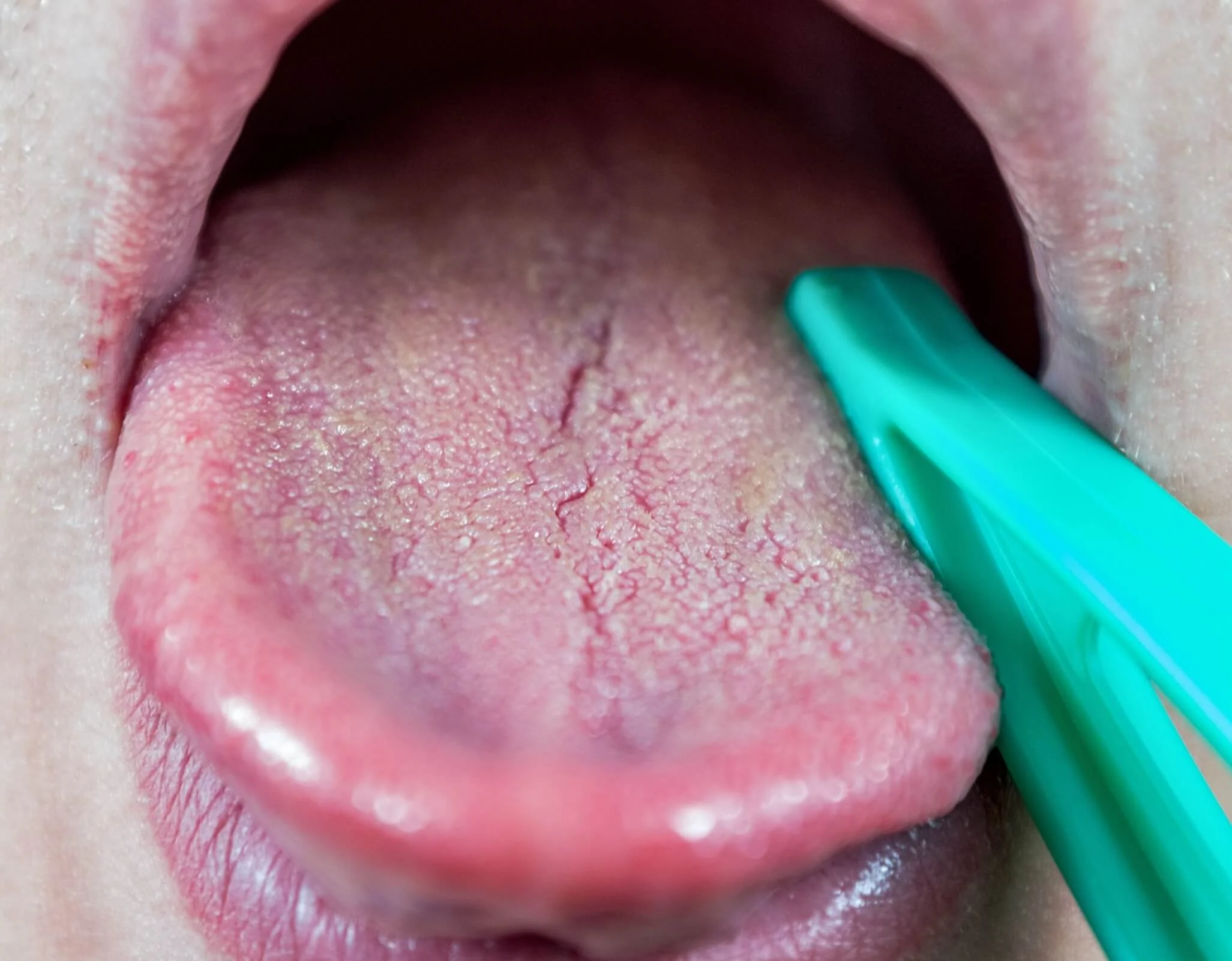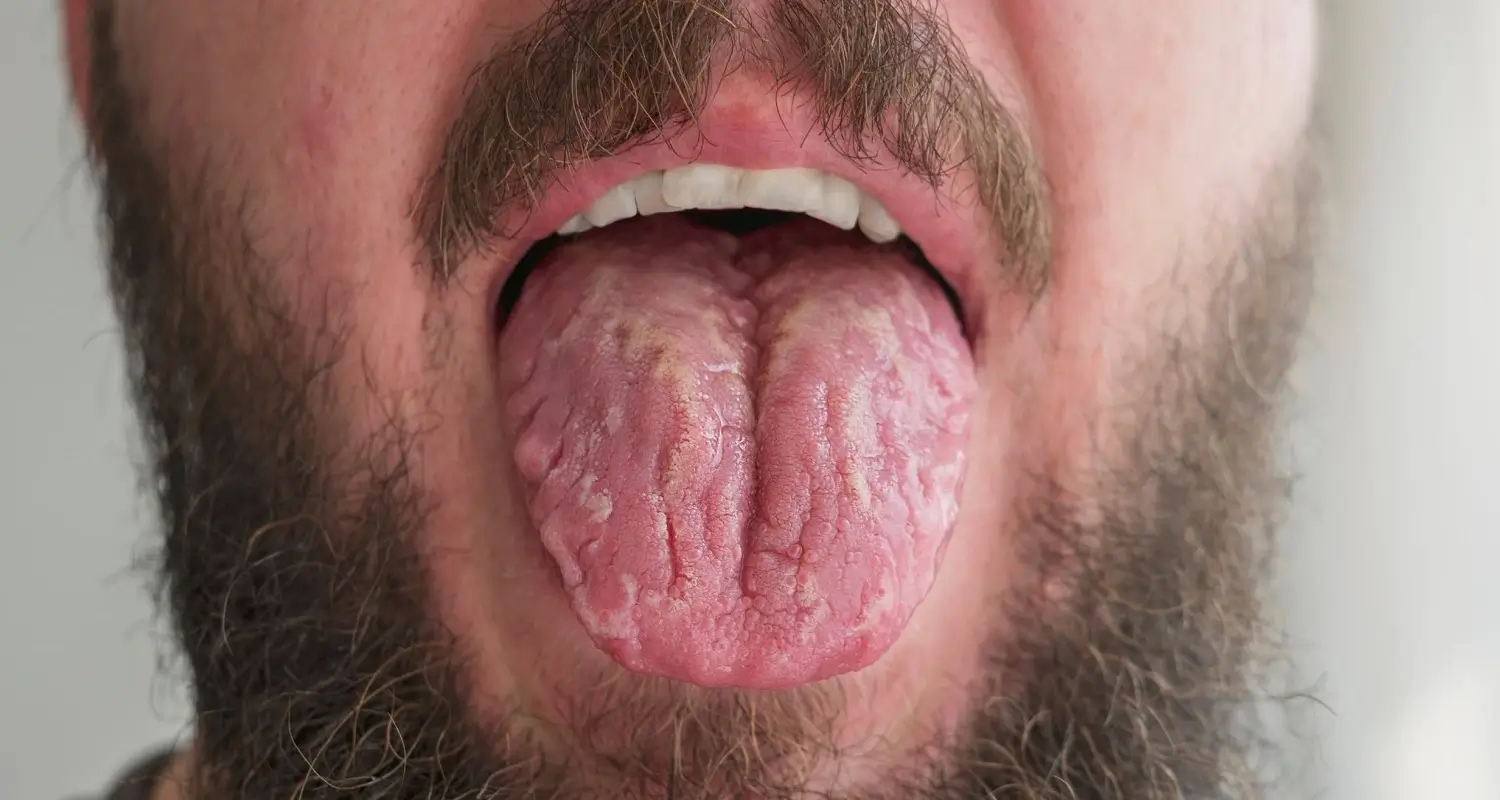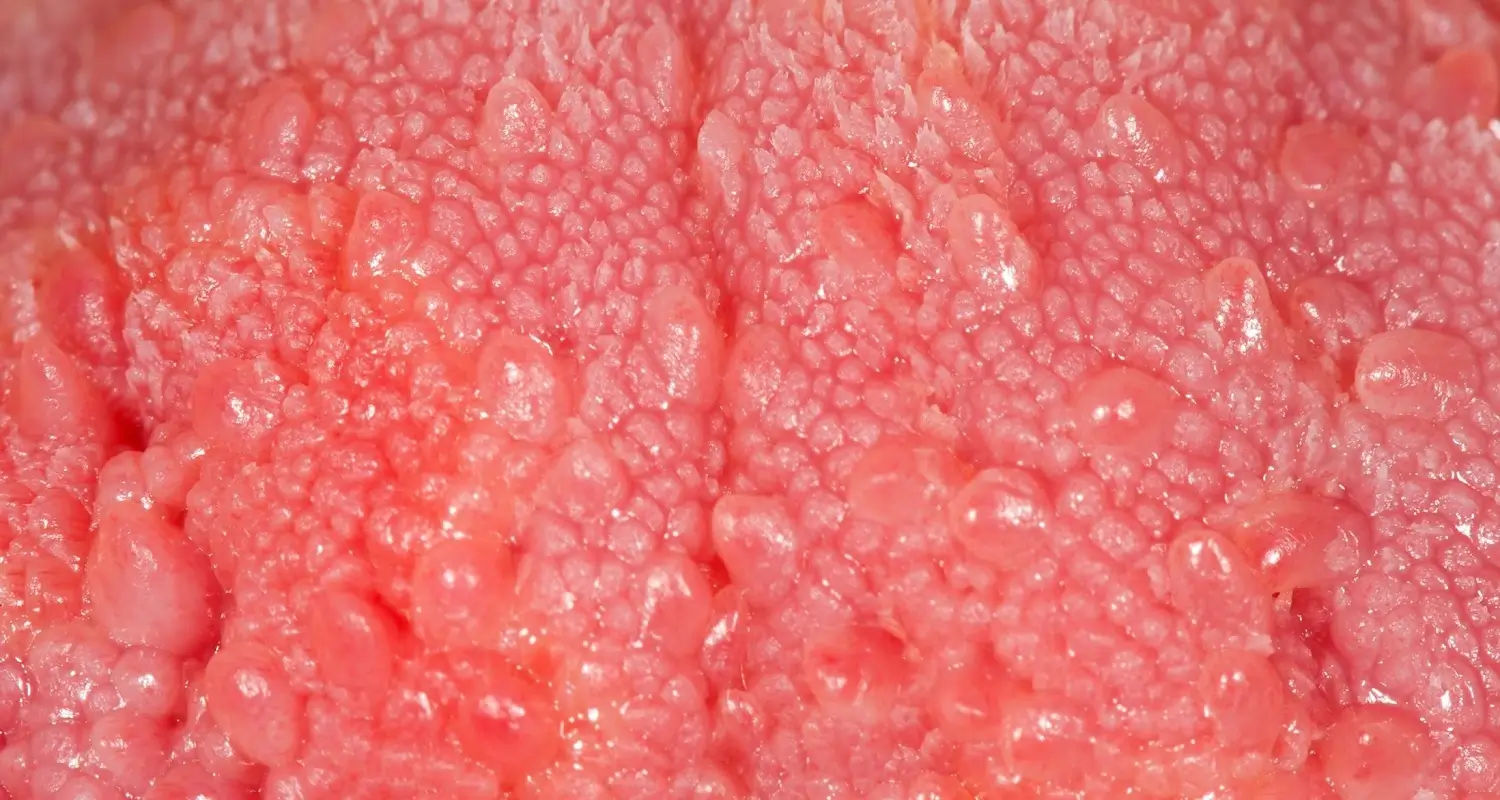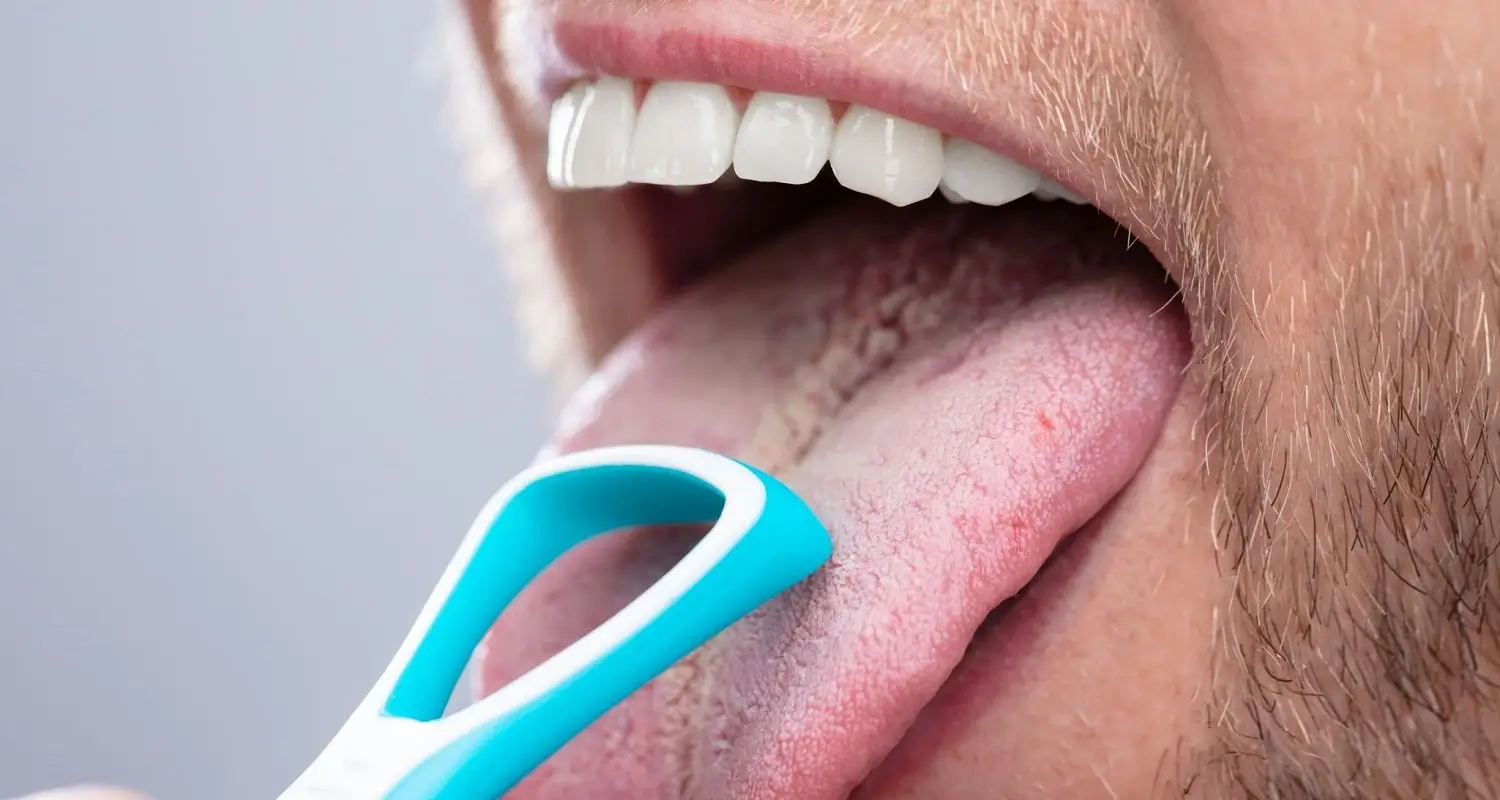Last Updated on: 27th December 2025, 06:17 am
What is Fissured Tongue?: A Complete Guide
The tongue is a complex organ made up of many muscles and vital structures such as taste buds, it is located on the floor of the mouth, positioned between the teeth of the lower jaw. This organ has important functions such as speech, chewing, the formation of the bolus, suction, and the perception of flavors in our food.
Its care is essential, and conditions such as a fissured tongue can affect the well-being and integrity of the organ. In this article, we will explore the condition in depth and guide you on suitable treatment.
Understanding Fissured tongue
The fissured tongue (also known as a scrotal tongue, plicated tongue, or lingua plicata) is a variation of the lingual surface, where the taste buds (the dorsum area) are located, presenting fissures or clefts in the middle and tip of the organ.
Who is Affected by this condition?
According to experts, a fissured tongue tends to affect men, and the possibility of its appearance increases with age. In the general population, it affects between 10 and 20% of individuals duals and is a relatively common condition.
Is it associated with a particular disease or condition?
Yes, people who have any of the following conditions are more likely to suffer from a fissured tongue:
● Removable dentures
● Geographical language
● Pernicious anemia
● Psoriasis
● Acromegaly
● Macroglossia (Increased tongue size)
● Oral-facial-digital syndrome type I
● Pierre Robin syndrome
● Down syndrome
● Melkersson Rosenthal Syndrome
Cracked Tongue vs Geographic Tongue
A geographic tongue or migratory glossitis has a distinctive appearance: patches without taste buds surrounded by a discolored, raised snake-shaped border are observed. A fissured tongue is characterized by the presence of cracks or indentations. A geographic tongue and a cracked tongue can occur individually or simultaneously in the same patient. If you’re looking for a trustworthy source to help treat the disease, you may also read our article on “Treatment for Geographic Tongue“.
Common Causes
A fissured tongue may be caused by changes in the epithelium, lamina propria, and/or the muscles of the tongue, which is why its appearance at an advanced age is more common. It also occurs due to a deficiency of some vitamins or nutrients in the diet, and medication use in the diseases listed previously.
 Is it a Sign of Vitamin Deficiency?
Is it a Sign of Vitamin Deficiency?
Yes. In some cases, a fissured tongue occurs with a deficiency of any of the following nutrients:
● Vitamin B
● Vitamin A
● Vitamin E
● Vitamin B12 (occurs in pernicious anemia)
● Riboflavin
● Iron
What Foods Cause a Fissured Tongue?
The consumption of very acidic, spicy, bitter, or salty foods produces changes in the composition of saliva that directly affect the tongue. Here is a list of foods that can cause or worsen this condition:
● Pineapple
● Lemon, orange, or citrus fruits
● Acidic drinks
● Alcoholic beverages
● Chili pepper and foods with capsaicin
● Strong and odorous condiments
● Ultra-processed foods with a high amount of salt (potato chips, salted peanuts)
What is a Fissured Tongue? Signs and Symptoms
You can directly observe the back of your tongue, that is, where the taste buds are. If you notice cracks and/or indentations in its middle or anterior portion, you suffer from a fissured tongue. Other signs can alert you such as:
● Persistent bad breath or halitosis
● Inflammation of the tongue
● Pain or burning sensation in the mouth
Does Fissured Tongue go away on its own?
This kind of condition will not disappear on its own if the indentations or cracks are very deep, as they suggest a condition that has been established for a long time. It may disappear or partially resolve if the indentations are shallow and associated with a vitamin deficiency that can be treated. In this case, you should consult with your doctor, who, after carrying out a thorough evaluation, will determine what treatment is indicated for your case.
Diagnosis and medical evaluation
A fissured tongue is diagnosed through clinical examination: the dentist or health professional investigates your medical history to know your general state of health and then determines the presence of the condition through observation and an exhaustive examination.
Complications: Why Does Having a Fissured Tongue Hurt?
Usually, a fissured tongue does not hurt; however, there are cases in which pain may occur, for example:
● Inflammation of the tongue due to poor oral hygiene
● Fungal infections such as Candida albicans
● Feeling of dry mouth
How is a Fissured Tongue Treated?
The treatment indicated by experts for the care of a fissured tongue is based on the condition; then complete instructions on oral hygiene are given with an emphasis on the effective control of the bacteria present on your tongue. Periodic check-ups with your dentist will follow.
When complications are present, the doctor or dentist may indicate:
● Use of specialized rinses prescribed by a dentist.
● Manaofnt with medications.
● Saliva substitutes (when saliva production is deficient).
Care Tips
Below, we present 7 tips on caring for your tongue, which should help you treat the condition and live normally:
1. Use tongue scrapers or cleaners regularly (at least once a day)
2. Use alcohol-free mouthwashes
3. Reduce consumption of spicy, sour and salty foods
4. Avoid smoking and alcohol consumption.
5. Attend regular check-ups with your dentist and family doctor.
6. Stay hydrated
7. Eat a balanced diet, consuming fruits and vegetables rich in vitamins and minerals.
Use these articles as a resource to learn more about tongue disorders like tongue thrust, black tongue, and tingling tongue.
Conclusion
● A fissured tongue is a common condition, which, in most cases, does not cause pain or require complex interventions.
● The treatment of the condition is based on correct oral hygiene, regular visits to the dentist, and healthy lifestyle habits such as a balanced diet and plenty of water consumption.
● When secondary complications occur, it is essential to see your primary dentist. He or she will be in charge of giving you an accurate diagnosis and correct treatment for the fissured tongue.
Frequently Asked Questions
Because does the tongue get cracked?
The precise cause of a fissured tongue is still an enigma to researchers. The condition may have genetic roots, evidenced by its more frequent occurrence in members of the same family. Additionally, it could be related to other underlying diseases. However, many experts consider a fissured tongue to be simply a variant within the spectrum of what is considered a normal tongue.
What characteristics and differences does fissured tongue have?
A fissured tongue may have a wrinkled appearance, with cracks or channels that vary in severity among individuals. This condition could be linked to deficiencies of vitamin B12, vitamin B9 (also known as folate) and ferritin, a protein essential for iron storage.
Is a fissured tongue a benign condition?
A fissured tongue, known for its marked grooves on the top of the tongue, is a harmless condition. Frequently, it is associated with a geographical tongue.
How can I prevent a fissured tongue?
To prevent the buildup of food debris in the grooves of a fissured tongue, it is essential to incorporate the use of a tongue brush or scraper into your daily oral hygiene routine. A 2013 study revealed that brushing and scraping the tongue, in addition to regular tooth brushing, not only helps keep the tongue cleaner, but it also contributes to the reduction of dental plaque.
Share:
References
1. AAOM Web Writing Group. (May 13, 2015). Fissured tongue. Aaom.com. https://www.aaom.com/fissured-tongue
2. Mayo Clinic Staff. (Sep 7, 2023). Geographic tongue. Mayo Clinic. https://www.mayoclinic.org/diseases-conditions/geographic-tongue/symptoms-causes/syc-20354396
3. Fletcher, J. (Nov 21, 2019). Fissured tongue: Causes and treatment. Medicalnewstoday.com. https://www.medicalnewstoday.com/articles/327089
4. Roth, E. (Sep 7, 2012). Fissured tongue: Pictures, symptoms, causes & more. Healthline. https://www.healthline.com/health/fissured-tongue
5. Stuart, A. (Mar 20, 2023). Fissured tongue. WebMD. https://www.webmd.com/oral-health/fissured-tongue
6. Feil , N. D. , & Philippi , A. (2016). Frequency of fissured tongue (lingua plicata) as a function of age. Swiss Dent J, 126(10), 886-897. https://pubmed.ncbi.nlm.nih.gov/27808348/
7. Reamy, B. V., Derby, R., & Bunt, C. W. (2010). Common tongue conditions in primary care. American family physician, 81(5), 627-634. https://www.researchgate.net/publication/41620202_Common_Tongue_Conditions_in_Primary_Care
8. Mangold, A. R., Torgerson, R. R., & Rogers III, R. S. (2016). Diseases of the tongue. Clinics in Dermatology, 34(4), 458-469. https://www.sciencedirect.com/science/article/abs/pii/S0738081X16300505?via%3Dihub
-
Nayibe Cubillos M. [Author]
Pharmaceutical Chemestry |Pharmaceutical Process Management | Pharmaceutical Care | Pharmaceutical Services Audit | Pharmaceutical Services Process Consulting | Content Project Manager | SEO Knowledge | Content Writer | Leadership | Scrum Master
View all posts
A healthcare writer with a solid background in pharmaceutical chemistry and a thorough understanding of Colombian regulatory processes and comprehensive sector management, she has significant experience coordinating and leading multidisciplina...



















